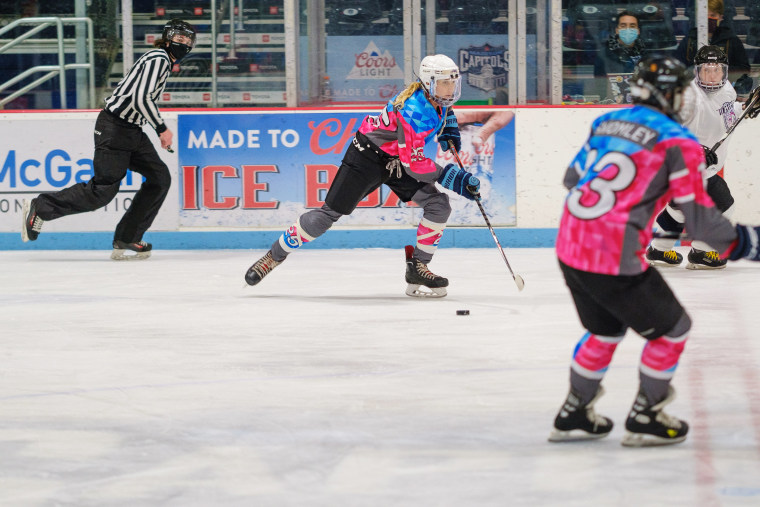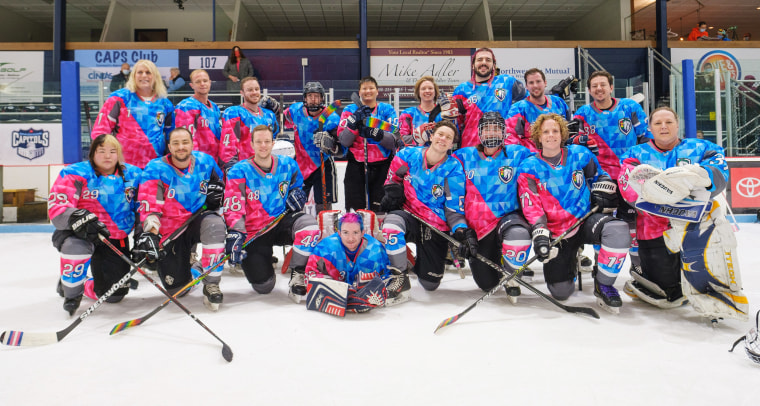Two years after 16 hockey players joined forces in Boston to become the first entirely transgender sports team in the United States, Team Trans — a growing group of novice to advanced players — reunited this past weekend at Capitol Ice Arena in Middleton, Wisconsin, to take on the Madison Gay Hockey Association in a weekend friendship series.
Following the success of its first friendship series against Boston Pride Hockey, an LGBTQ hockey team that was founded in 1989, Team Trans began to draw the interest of other trans and nonbinary hockey players from around the world. And while the Covid-19 pandemic foiled earlier plans for a reunion, players and organizers alike were keen to bring the event to the Madison area, where there is already an abundance of LGBTQ hockey players. In a spirited two-day tournament, Team Trans, which was split into three teams based on skill level, went undefeated in six games against the Madison team.
When the inaugural Team Trans first stepped off the ice and into the locker room two years ago, the players said they could tell that something was different. While many of them had played in LGBTQ leagues, they were often the only trans player on their team and struggled to find a community of trans athletes to talk to. But for one weekend, these players were all able to bond over a shared love for the sport and a mutual understanding of their personal struggles with gender identity.
“I keep meeting people that I’ve barely spoken to or haven’t spoken to directly, and I feel like I already know them in a way, just because of the shared experiences that we’ve had in hockey spaces,” Mason LeFebvre, a Team Trans goaltender and out trans man, told NBC News. “It’s just casual and comfortable from the start. We’re not going to ask each other a bunch of awkward questions that other people might ask if they know we’re trans. Then, we talk about other things that would be completely off the table for conversations with mostly cis[gender] people.”

Avery Cordingley, who plays center and uses gender-neutral pronouns, shared a similar sentiment.
“It’s feeling like you don’t have to get over a bunch of awkward hurdles before you can just exist together in a space,” they said. “Last night, I picked up a player at the airport at 11 o’clock, and we’re instantly chatting. We both have the experience of, like, ‘Are we going to be able to keep playing hockey if we choose to transition?’ And we didn’t even have to go into that. We’re just like, ‘Yeah, I’ve played hockey here and here and here.’”
For LeFebvre and Cordingley, who both played girls’ hockey growing up before beginning their transition and now compete as teammates on Team Trans, there was always an inherent need to consistently prove themselves in a male-dominated sport.
“But there’s an extra layer to it when you’re also trans, especially if you know it at that age,” LeFebvre said. “It’s extra uncomfortable because you belong in the boys’ locker room, but they don’t see that.”
Cordingley said it’s even more uncomfortable if you “don’t have the language” to articulate what you’re going through.
“Because you don’t know why you’re hurt, you don’t know why it hurts that you’re not allowed in there,” they explained. “For me, it’s like you get off the ice, and your teammates go one way, and you’re just alone in a room by yourself the other way. It’s alienating, it’s othering, it makes you feel like you don’t belong there, even if you love the sport and just want to play.”
According to the Movement Advancement Project, a nonprofit think tank, 10 states have recently passed laws to ban transgender youth from participating in school sports that align with their gender identity, with proponents claiming that this legislation is designed to keep all athletes on a level playing field. Having weighed the consequences that transitioning would have on their own futures in hockey, LeFebvre and Cordingley both said that getting to know a trans or nonbinary athlete is the first step to understanding the harm that these policies have caused.
“We should look at them as a human being with the same wants and needs as their own kids and their own friends,” Cordingley said. “It doesn’t matter what your gender identity is. Everyone wants that team, everyone wants to feel like they belong, everyone wants to play the game that brings them joy. We’re not blowing the competition away; we’re very average. They should just understand that trans athletes are regular athletes, and trans athletes can be very good at their sports, but so can cisgender athletes.”
LeFebvre said proponents of trans sports bans “just need to watch trans athletes complete and realize they are just athletes who happen to be trans.”
“It really doesn’t have anything to do with being trans — it has to do with dedication. Some of it is natural talent, but a lot of it is hard work and dedication, just like it is for anyone else,” he said.
Last month, the Premier Hockey Federation, formerly known as the National Women’s Hockey League, released a new inclusion policy that was developed in consultation with Athlete Ally, a nonprofit LGBTQ athletic advocacy group, and Chris Mosier, a transgender triathlete. The policy itself provides a pathway for the participation of both trans and nonbinary athletes in the federation.
While they both think that the federation has taken a step in the right direction, LeFebvre and Cordingley agreed that, until it is put into practice and updated with less ambiguous language, it will be hard to gauge the policy’s effectiveness.
“You could get a hormone exemption, so that someone like me or Avery theoretically could play in the league, but what does the exemption require?” LeFebvre said. “Maybe it’s completely reasonable stuff, maybe it’s not. We don’t know, because it’s not specific, and it might just be partially because you can’t be super specific on an individual basis. But also, if they just use the vagueness of it to not write any exemptions ever, then that’s not great, obviously.”
But for now, LeFebvre and Cordingley have turned their attention to the future of Team Trans, which has attracted hockey players from all over the United States, Canada and Japan. As a team, they hope to host a friendship series every year and travel to some LGBTQ tournaments, showing transgender athletes of all ages — but especially younger generations — that their dreams are not only valid but possible.
“We’re not going anywhere, and we just love the game like everyone else,” Cordingley said. “We all have a place in the game, and the game is stronger" because of our differences.
